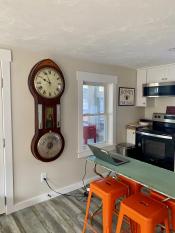C. Maspero. - Manchester. A very unusual Clock and Barometer combination. 223313.
This decorative wheel or banjo barometer is signed “C. MASPERO / Manchester.” Maspero is listed in Edwin Banfield’s book Barometer Makers and Retailers 1660 - 1900. The working dates he lists are from 1850 through 1870. Maspero was known to make elegant barometers, often with inlaid cases.
This beautiful wall-hanging case displays a clock and a barometer. The case is veneered in figured mahogany. The grain patterns are vibrant, and the finish is old and consistent. The case form is in the shape of a figure-eight. It is decorated with extensive cross-banding throughout. The painted iron clock dial is located at the top and is protected by a convex piece of clear gall fitted into a cast brass bezel. This bezel is hinged so that one can access the dial. The dial measures approximately 16 inches in diameter. The time ring features a closed minute ring and large Roman-style hour numerals. The large steel spade hands are easy to read from across the room. A single spring-powered fusee movement powers the clock. It is heavily constructed in brass and is of good quality. It is designed to run for eight days on a full wind.
In the middle section of the case features two thermometers protected by glass. The one on the left is a mercury thermometer, and the one on the right is alcohol-based. The engraved faceplates are brass and treated with a silver wash. They are formatted with an engraved numerical scale ranging from -10 degrees to a high of 160 degrees and include the following benchmarks, “Fever-Heat, Blood-Heat, / Sumr-Heat, / Tempe-rate/ and Freez-ing.” All of these are important markers on the thermometer scale. Additional decorative engravings frame the thermometer. The instrument maker signed his name at the top. The thermometers flank a central access door. Here, Napoleon is depicted standing on a rocky ledge with the sea behind him. One can speculate that Napoleon is pictured as a prisoner of the English at St. Helena from 1815 to 1821. The HMS Northumberland has just left port and is seen sailing away.
The lower section features a barometer dial that measures approximately 14 inches in diameter. This dial is also brass and features a silver wash finish. This dial is calibrated from 28” to 31”, engraved with typical weather indications. A fancy engraved compass star is in the center. The two hands are mounted in this location. The longer black hand is the pointer for the barometer. This hand records the current mercury level in the barometer tube inside the case. The smaller brass hand is manually adjusted by the operator/observer. The adjustment is performed by turning the knob above the barometer dial. One would set this brass hand under the current position of the black hand. When you return, the black hand will have moved away from the set brass hand. This reading illustrates the changing of the weather. Both hands are decoratively shaped. This dial display is also protected behind a convex piece of glass fitted into a cast brass bezel. The barometer is operated by a glass J-tube mounted inside the case.
It is very unusual to find a clock and a barometer combination constructed on this large scale. The case is approximately 55 inches long, 20 inches wide, and 5 inches deep. This is the second example we have owned in 50-plus years of business. We have seen one other example displayed in Europe. Clocks of this scale are impressive and may have been specifically ordered for a public place.
Inventory number 223313.


